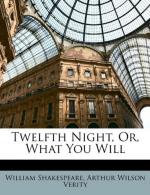|
This section contains 5,413 words (approx. 19 pages at 300 words per page) |

|
SOURCE: "Twelfth Night," in Shakespeare and the Uses of Comedy, The University Press of Kentucky, 1986, pp. 165-78.
In the following essay, Bryant asserts that Twelfth Night is an iconoclastic work that challenges the reassuring conventions of romantic comedy.
Ever since the time of the Romantics, high praise for Twelfth Night has been one of the commonplaces of Shakespeare criticism. In our own time Leo Salingar has called it the "crowning achievement in one branch of his art";1 and J. Dover Wilson, implicitly replying to Samuel Johnson, who complained that the latter half of the play "exhibits no just picture of life,"2 has gone even farther: "That gem of his comic art, that condensation of life and (for those who know how to taste it rightly) elixir of life," were Wilson's superlatives; then he added, "He could never better this—and he never attempted to. He broke the mold...
|
This section contains 5,413 words (approx. 19 pages at 300 words per page) |

|


